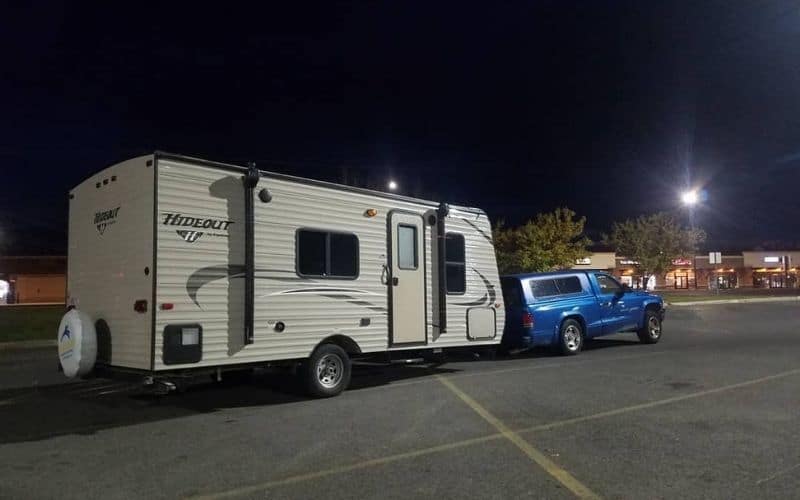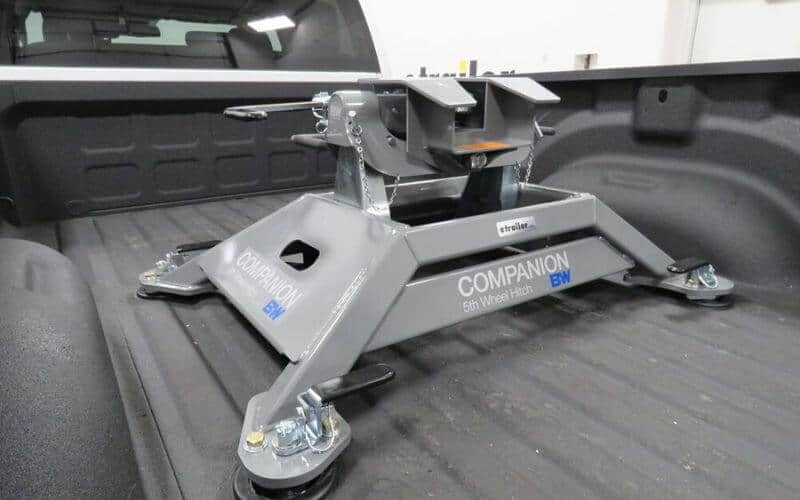There is nothing more satisfying to me than taking the RV on the road for a big adventure.
It’s an amazing feeling to have a home on wheels to take with us to explore new places and make new memories.
But before my family and I can enjoy our adventure, we need to know if our travel trailer is safe for travel. Knowing the weight of our rig is part of that safety measure.
Where, how, and why should RVers weigh their motorhomes, travel trailers, or fifth wheels?
There are various places where you can get your camper weighed. You can have it weighed at a truck stop using CAT scales, or it can be weighed by individual tire position by the RV Safety and Education Foundation (RVSEF). Weighing your RV is important for many reasons—from avoiding tire blowouts to knowing the appropriate tow vehicle to use to traveling over bridges safely.
Let’s discuss in detail why it is important to have your RV weighed. We will also consider where you can go to get this service and what the process is like.
Why Should You Have Your RV Weighed?
Safety is the primary reason to weigh your RV. Whether you drive or tow your rig, traveling with it overloaded places you, your passengers, and everyone on the road with you in danger.
Here are some hazardous situations weighing your RV may help you to avoid:
1. Tire failure
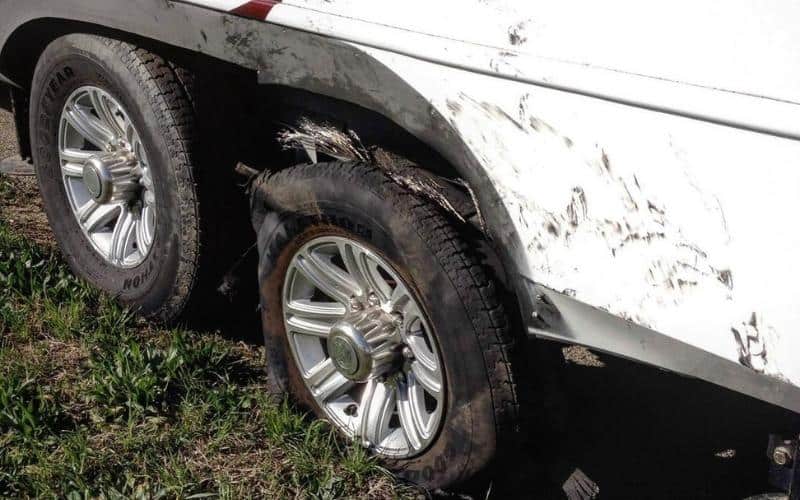
Having an overloaded RV can cause your tires to exceed the weight rating. When this happens, increased friction occurs on the walls of the tires.
The friction will cause a buildup of heat, and overheating can lead to premature wear, tread separation, and ultimately tire blowouts.
A tire blowout can severely damage the flooring and skirting of an RV. Even worse, tire failure can make you lose control and have an accident.
2. Exceeding Bridge or Road Weight Limits
You may need to travel across a bridge or road with a maximum weight limit. If you don’t know your weight, you could end up with a ticket or in very serious danger.
3. Axel and Suspension Strain
Overloading your RV axles can cause extra wear and strain on the suspension components of your RV or tow vehicle.
Axel or suspension failure can lead you to lose control of the vehicle(s) and perhaps cause an accident.
4. Tow Vehicle Damage
Overloading a travel trailer or fifth-wheel can damage your tow vehicle. Your RV’s weight could exceed tow capacity without you knowing it.
This can overwork the vehicle and cause damage to the engine, transmission, and other components over time.
Gradually, this could result in significant failure of the tow vehicle and require major repairs or worse.
Understanding RV Weight Ratings
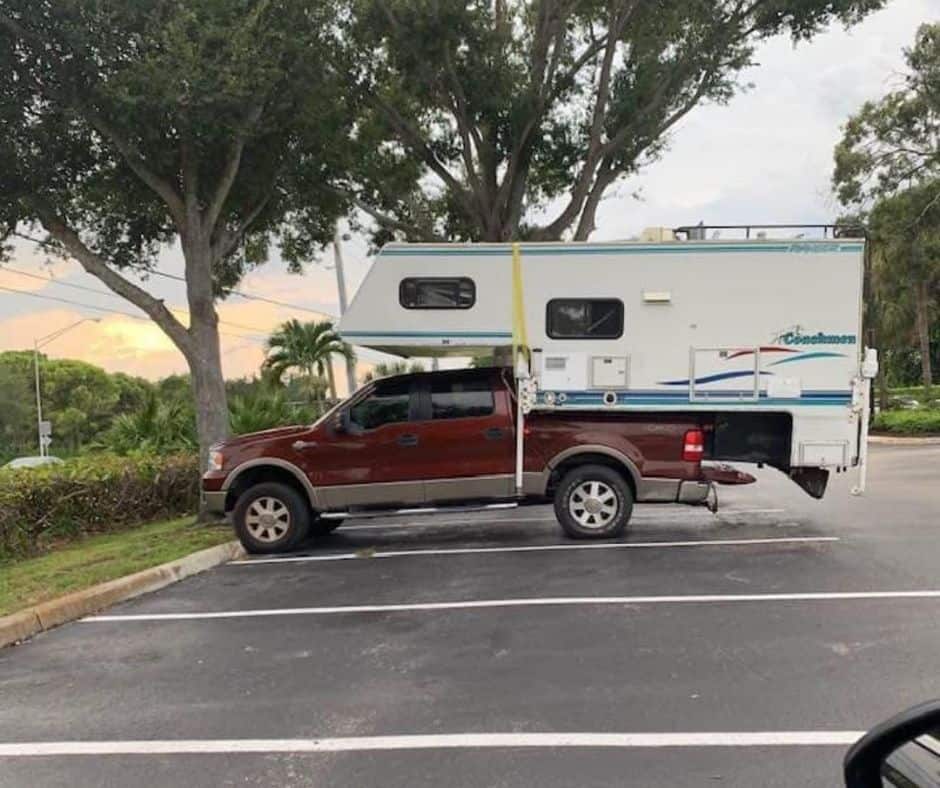
Now that we see how important it is to ensure your RV is not over its weight limits, we need to understand the weight ratings.
This will help us to know what to look for when the RV is weighed.
These ratings are often expressed by several acronyms that can be confusing. Let’s discuss 4 of them and their meanings.
Gross Vehicle Weight Rating (GVWR)
One of your RV’s most important safety considerations is the Gross Vehicle Weight Rating (GVWR).
The GVWR is the vehicle’s maximum weight capacity when fully loaded with passengers, cargo, fluids, and fuel.
You can find this information in your camper’s owner’s manual or on a sticker or plate attached to your RV.
You can also find your rig’s specifications online on the manufacturer’s website.
Knowing your GVWR lets you know if you are safely within the vehicle manufacturer’s weight limits and highway regulations.
When you get your RV weighed, you will learn the actual Gross Vehicle Weight (GVW) so that you can be sure it doesn’t exceed the GVWR.
Cargo Carrying Capacity (CCC)
The cargo carrying capacity (CCC) determines how much weight you can add to your unloaded RV without exceeding the weight limit.
Gross Axle Weight Rating (GAWR)
The maximum weight each axle on the RV can safely carry is called the gross axle weight rating (GAWR).
If the actual weight on the axles exceeds this number, the suspension components can become overloaded and cause failure, possibly leading to an accident.
Gross Combined Weight Rating (GCWR)
The maximum combined weight of a tow vehicle and the vehicle being towed is the gross combined weight rating (GCWR).
This rating is important when vehicle towing is involved—whether you have a truck or SUV towing a travel trailer or fifth wheel or if your motorhome is towing a car.
Before You Weigh Your RV…
Load it up!
You’ll want to know the weight of your rig when it is packed up for travel. The only way to know how much the RV weighs when fully loaded is to weigh it with genuine, realistic loads.
So make sure you have all the passengers, fuel, water, supplies, clothing, and bedding you would normally bring for a trip.
Now you’ll be able to tell if your normal load is under or over your weight limits when you weigh your rig.
Where to Weigh Your RV
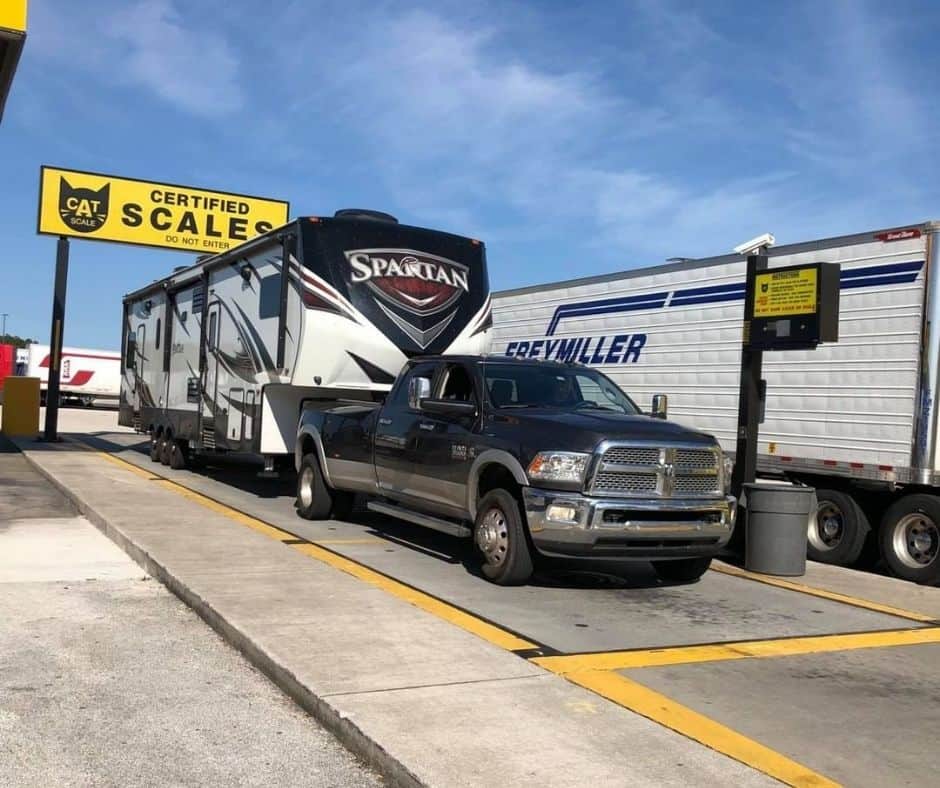
Now that we’ve discussed how important it is to weigh your RV, where can you go to have your RV weighed? Here is a basic overview of the options:
Let’s look at the details about using 2 of the popular options listed here: CAT scales and RVSEF wheel position weighing.
How To Weigh Your RV Using CAT Scales
Many truck stops have certified CAT scales, and they also allow RVs to be weighed there. It usually costs between $10-$15 to use this service.
CAT scales line up three scales in one, allowing them to record total vehicle weight and the weights on the axles at once.
You have to be sure to line up your vehicle with the axles on the right scales.
You can conveniently get your weighing results electronically through their “Weigh My Truck” app or by email.
Here’s how to use CAT scales to weigh your camper:
Weighing a Class A, B, or C motorhome or truck camper using CAT Scales:
Pull up to the scale and make sure your window aligns with the call box.
Your front wheels should be on the first scale, and your rear wheels should be on the second scale.
If you have a vehicle you are towing, it should be on the third scale. See the images below:
Image source: catscale.com/how-to-weigh/
If you are not using the app, you’ll press the call button to speak to an attendant who will initiate the weighing. If you are using the app, the process will be electronic.
When you get your results (either on the app or by getting the printed report), make sure the gross (total) weight doesn’t exceed your RV’s GVWR and that the steer axle and drive axle weights don’t exceed the GAWR.
Weighing a fifth wheel or travel trailer using CAT Scales:
If you are weighing a fifth wheel or travel trailer, you will have a little bit more to consider.
You need to consider the weights of the vehicles and the contents, but also the weight of the hitch.
“Tongue weight” is the weight that the trailer is applying to the back of the tow vehicle. This can also be referred to as “pin weight” on a fifth wheel.
It’s important that there’s not too little tongue weight, or it will create potentially dangerous sway in the trailer.
If there is too much tongue weight, on the other hand, the towing vehicle’s rear tires will be overloaded, causing the vehicle’s rear end to be pushed down.
As a result, the vehicle will become difficult to steer, and braking may become less responsive, all of which are potential hazards.
For a hitched travel trailer, tongue weight should be no less than 10% of the trailer weight, and for a fifth wheel, it should be no less than 20%.
When you take your travel trailer/fifth wheel to the scales, you want to find these weights:
If you are weighing a travel trailer, you want to make sure your tongue weight is less than the maximum tongue weight allowed by the tow vehicle hitch and that the tongue weight percentage is greater than 10%.
If you have a fifth wheel, make sure the pin weight is less than the maximum pin weight for your fifth wheel hitch.
Here’s the process:
Again, pull up to the scale with your driver’s side window lined up with the call box.
The front wheels of the truck or SUV you’re towing with should be on the first scale, the rear wheels of your towing vehicle should be on the second scale, and the fifth wheel or travel trailer tires should be on the third scale. See the images below:
Image source: catscale.com/how-to-weigh/
Press the call button for the attendant. Say that you have an RV trailer and need a second weigh-in of the tow vehicle after this weigh-in.
That way, they’ll be expecting you to come back around and may only charge you for a re-weigh (about $3 more.)
Tell the attendant to record the weights from the 3 scales for you. Let’s refer to them here as Weight 1, Weight 2, and Weight 3.
You should then drive off the scale, unhitch the trailer, and return to the scale with only the tow vehicle. This is so you can calculate the tongue or pin weight.
The axles of the tow vehicle can be split between the two scales. Add those 2 weights, and we’ll refer to that total as T. Weight.
You’re going to need to have available the weight rating information for your tow vehicle.
You can find this information online from the vehicle manufacturer’s website or the owner’s manual.
When you get the weight results, you’ll be making comparisons to be sure that not only do none of the weights of the trailer/fifth wheel exceed the ratings, but that the weights of the tow vehicle are also within the specified ratings.
So here’s what you’ll be checking for when you get your results:
Ensure that none of these 3 weights exceed the GAWR of the tow vehicle or trailer.
(Remember that T. Weight is the axle weight of the tow vehicle without the trailer that you received in the report.) Next, make these calculations:
If you find that any of these weights exceed gross weight ratings, make adjustments to your load and re-weigh.
RVSEF Wheel Position Weighing
The RV Safety and Education Foundation (RVSEF) is a non-profit organization that provides the RV world education that focuses on safety.
The RVSEF says that wheel position weighing, specific to RVs, is the only way to know the proper inflation rate for your tires.
As discussed earlier, an RV that exceeds its weight rating can cause tires to exceed their weight rating.
And overloaded tires can lead to blowouts, which in turn can lead to very dangerous situations.
During wheel position weighing, each of your RV’s tires will be weighed individually so you can know how much weight each tire is supporting.
This is beneficial because weight is not divided in perfectly even ways. One tire may be supporting an appropriate load due to its position, whereas the tire across from it may be overloaded due to where it sits on the rig.
Here’s the process to weigh your RV the right way:
1. Make an appointment with RVSEF and fill out the required forms.
2. Arrive at the designated weighing site (preselected for levelness and convenience) with your RV loaded as you would for a trip.
3. If you have a motorhome, they will put the vehicle on their specialized scales, take the readings, and provide you with a report. The process is the same if you have a towable travel trailer or fifth wheel, except they will weigh the tow vehicle separately to find the pin or tongue weight.
When you get the results, you’ll know which areas of your RV need weight adjustments for tire safety.
You‘ll also know how best to inflate or even remove air from the tires based on the specific weights they are supporting.
How Much Does It Cost to Weigh an RV?
How much you pay to have your camper weighed depends on where you go for this service.
You may be able to weigh your RV for free at sand and gravel yards, feed companies, or moving companies. You’ll have to call to see if they are willing to provide this service for you.
If you use the CAT scales to for weighing your RV, you can expect to pay $10-$15 for the 1st weigh and $3 for any re-weighs.
Wheel position weighing with RVSEF currently costs $60 for motorhomes and truck/trailer combos. Weighing any other tow vehicles will cost an additional $40.
For Safety’s Sake, Weigh Your Rig!
Weighing your RV is definitely not the most exciting aspect of RV travel.
But it can provide peace of mind knowing that your rig is not exceeding any weight ratings or compromising safety standards.
Do you have a preferred method of weighing your RV? Let us know in the comments below!

